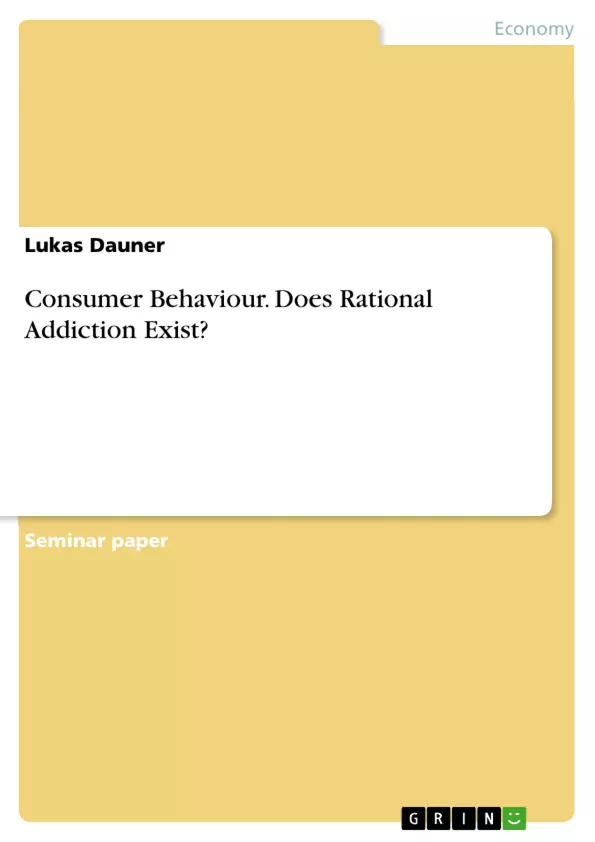It is proposed by Gary S. Becker and Kevin M. Murphy that addictive behavior could be usefully integrated in the rational choice framework. According to their theory, consumers are forward-looking in their decision making and calculate present and future consequences of consuming an addictive good. Becker and Murphy even claim that analyzing addictions as a rational choice offers new insights and a better understanding of addiction.
Earlier economic models typically explain addictions with irrational or myopic behavior in which individuals ignore or highly discount the future when making their decisions. While the rational addiction model has become a standard tool in the economic analysis of addictive behavior, it has also been subject to much criticism. As shown in this paper, there is much evidence that model’s assumptions are unrealistic. It is argued however that the model’s predictions rather than its assumptions should be rejected based on the empirical evidence.
By reviewing empirical studies which tested the Becker Murphy model, this paper seeks to examine to what extent the rational choice approach can be legitimately applied to addictive behavior. The model’s assumptions and implications will be explained. later, the main criticisms about the theory will be discussed. After that, the most relevant studies and their implications will be reviewed.
Inhaltsverzeichnis (Table of Contents)
- Introduction
- The Rational Addiction Model
- Critiques of the Rational Addiction Model
- Empirical Analysis
- Discussion
- Conclusion
Zielsetzung und Themenschwerpunkte (Objectives and Key Themes)
This paper explores the applicability of the rational choice framework to addictive behavior. It examines the rational addiction model proposed by Becker and Murphy, analyzing its core assumptions, critiques, and empirical evidence.
- Rational addiction model
- Critiques of the rational addiction model
- Empirical evidence for the rational addiction model
- Implications for understanding addictive behavior
- Discussion of the model's limitations
Zusammenfassung der Kapitel (Chapter Summaries)
- Introduction: This chapter introduces the rational addiction model and its significance in understanding addictive behavior. It outlines the paper's objective and structure.
- The Rational Addiction Model: This chapter explains the core assumptions of the rational addiction model. It defines rational behavior in the context of addiction and discusses how the model integrates addictive behavior into the rational choice framework.
- Critiques of the Rational Addiction Model: This chapter examines criticisms of the rational addiction model. It highlights potential limitations and challenges to the model's assumptions and predictions.
- Empirical Analysis: This chapter reviews relevant empirical studies that have tested the predictions of the rational addiction model. It analyzes the findings of these studies and discusses their implications for understanding addictive behavior.
Schlüsselwörter (Keywords)
The key concepts and focus topics of this paper include rational addiction model, addictive behavior, rational choice theory, empirical studies, critiques, and limitations. The paper explores the validity of applying the rational choice framework to understand addictive behavior, examining the assumptions, criticisms, and empirical evidence surrounding the rational addiction model.
Frequently Asked Questions
What is the Becker-Murphy rational addiction model?
It is an economic theory suggesting that addictive behavior can be part of a rational choice framework, where consumers are forward-looking and calculate the future consequences of their consumption.
How does the rational addiction model differ from earlier economic models?
Earlier models often explained addiction as irrational or myopic behavior, assuming individuals ignore or highly discount the future when making decisions.
What are the main criticisms of the rational addiction model?
Critics argue that the model's assumptions—such as perfect foresight and perfect rationality—are unrealistic when applied to the complexities of human addiction.
Is there empirical evidence supporting the model?
The paper reviews various empirical studies that test the model's predictions. While it is a standard tool in economics, the evidence often suggests that the model's predictions may not hold up in real-world scenarios.
What is the conclusion regarding "rational" addiction?
The paper examines to what extent the rational choice approach can be legitimately applied, suggesting that while useful for modeling, it has significant limitations in explaining the actual behavior of addicts.
- Citation du texte
- Lukas Dauner (Auteur), 2018, Consumer Behaviour. Does Rational Addiction Exist?, Munich, GRIN Verlag, https://www.grin.com/document/416898



